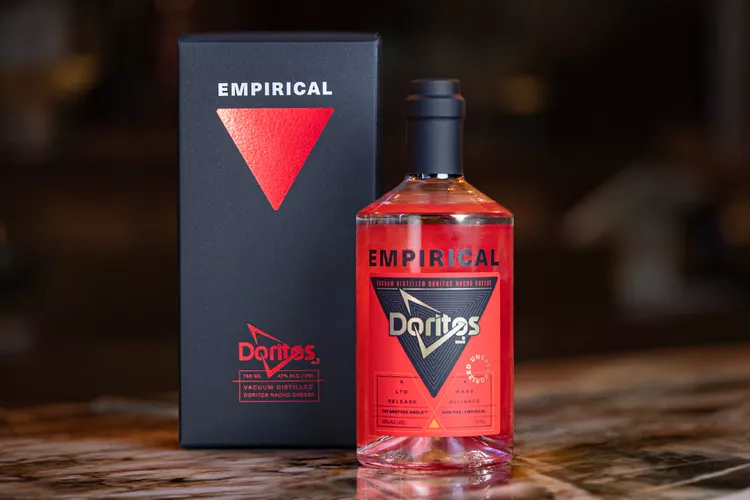
(Courtesy of Empirical)
Andy Warhol once said he loved Coca-Cola because regardless of who bought a bottle, it remained the same product for everyone. “A Coke is a Coke and no amount of money can get you a better Coke than the one the bum on the corner is drinking. All the Cokes are the same and all the Cokes are good.”
Warhol presumably thought the same of row upon supermarket row of Campbell’s soup cans. All cans of Campbell’s condensed tomato soup, clam chowder, chicken noodle, et al., are the same. But do you really need that much sodium in your dinner bowl?
The screaming irony of pop art is that this exaltation of consumer products and cultural figures into limited-edition prints would later break auction records limited to the billionaire class. Even before that, of course, Warhol’s curious art ethos was limited to a jet-set class of taste-mongers far removed from the quaint charms of the middle class. The egalitarian qualities of American consumerism Warhol celebrated still exist. A Coke remains a Coke. But good luck finding a member of the upper class who still drinks one on occasion.
The larger truth of what blew up America’s egalitarian landscape of food and consumer products, though, is an elitism that resulted from the marketing quest for endless choice, variety, and sometimes, even ill-advised re-invention. Even Warhol’s beloved Coke fell for this ruse when, in 1985, it launched a disastrous updated formula of its classic recipe, then beat a hasty retreat back to its original product. Warhol may have had no idea that his simple love for consumer icons would smash all competitors (so far) in auction-house value, but he knew a classic when he saw it.
Here to scramble the board again is a new line of spirits coined in flavors that, upon first sight, are sure to leave professed “foodies” aghast, but that might possibly seduce them if given a chance. The Doritos Nacho Cheese Spirit, developed by the Copenhagen-based company Empirical, is exactly as advertised. That is, it packs all the piquant flavor of a bag of Doritos into a liquor bottle that retails for $65. If that sounds too gauche, or even just plain gross, there is New Hampshire-based Tamworth Distilling’s House of Tamworth Saison De Frai, a brandy anchored in the outdoorsy aroma of smoked trout. Do not expect a price break, however. It, too, will set you back $65 for one 200ml bottle.
Strictly speaking, alcoholic beverages have little business in the domain of what we generally call “food.” Thanks to the healthy trend of “Dry January” and the increasing public acknowledgment that any consumption of alcohol carries health risks, no one needs a case of Pabst, let alone some outrageous taste concoction trapped in a $65 bottle, for nutritional needs. Food is a necessity that stretches into a luxury only as long as your bank account is large.
What is flabbergasting about these products, especially Empirical’s Doritos liquor, is the brashness with which they turn the low-brow into high-brow. In homage to the egalitarian spirit, Warhol turned consumer brands into art. In the quest for innovation in the name of profit, these companies have dared turn kitsch flavors, or in Tamworth’s case, at least the rustic flavor of a campfire meal, into something only the rich, or an extremely curious member of the middle class, will find a way to afford.
Sure enough, even Food & Wine, in its online write-up of Empirical’s outlandish liquor, describes the product in prose at once playful and high-toned: “The bouquet is brimming with the unmistakable tang of cheese dust. But in the sip, it’s all about the cornier elements. It leaves your palate with a drying not, akin to what accumulates on your tongue after you’ve crushed a sizable bag of corn chips. In other words, it’s maybe more Fritos than Doritos.”
The culprit in all this, it seems, is the corporate itch for mainstream food chains to branch outward, and upward, into the wallets of foodies who have a penchant for alcohol and know no fear. In this world, KFC’s Dead Man’s Fingers spiced rum begets Eggo’s 40-proof Brunch in a Jar begets Dunkin’s Spiked Iced Coffee (6 percent alcohol by volume) until we get a bag of Doritos liquified for upscale sipping.
A Coke is a Coke for the same person, regardless of income or status, and with or without rum. Late-stage capitalism, always on the lookout to circumvent stagnation, means that a simple bag of Doritos calls from the supermarket shelf to everyone and in the same way. The only difference now, especially in light of our increasingly wacky world of food innovations, is whether or not you feel like drinking its umami essence in a shot glass, as opposed to munching it with friends. In terms of dilemmas that only capitalism could possibly invent, what could be more cheesy?
